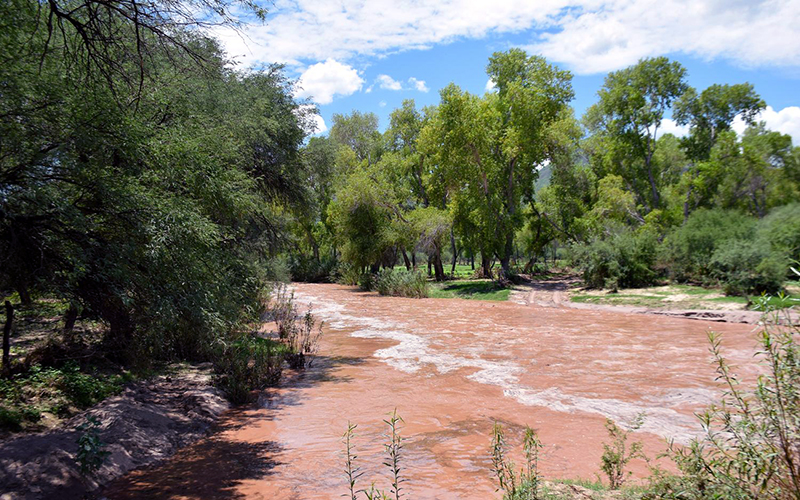
The Rio Sonora flows through the pueblo of Baviácora, Sonora, Mexico, near the western edge of the Sierra Madre. Although wells along the river have been deemed safe, many residents still use bottled water. (Photo by Kendal Blust/KJZZ)
HERMOSILLO, Sonora, Mexico – The Second Chamber of Mexico’s Supreme Court last week unanimously granted legal protection to communities affected by a 2014 mining spill in the Rio Sonora. Residents of seven communities affected by the spill hope the ruling will provide relief they’ve been seeking for more than five years.
On Aug. 6, 2014, Mexico’s largest mining company, Grupo México, spilled nearly 11 million gallons of copper sulfate acid solution and heavy metals from its Buenavista copper mine into the Bacanuchi and Sonora rivers. It’s considered the worst mining disaster in Mexican history, affecting more than 22,000 people in riverside towns downstream from the mine in Cananea.
The spill, which the mining company didn’t report for more than 24 hours, has caused health problems, economic struggles and environmental damage in the Rio Sonora Valley. Although wells along the river have been declared safe, most residents living near the river still rely on bottled water, and they’re terrified of contracting cancer.
Despite the severity of the spill, residents say there has been no remediation, and they weren’t included in a decision to close the trust fund Grupo México set up to address the damage. They argue that the fund was terminated in 2017 before all the funds were spent and without completing the mitigations it was created to provide.
The recent court ruling could change that, said Fernanda Hopenhaym, co-director of PODER, a nonprofit working to improve corporate transparency and accountability in Latin America that has provided legal representation for Rio Sonora Valley residents. The ruling, she said, affirms that the trust fund was closed incorrectly.
“People are really happy and have a lot of expectations,” Hopenhaym said. “Hopefully, this will be a good ruling that really beings remedy to the communities.”
The process wasn’t transparent, she said.
“It didn’t consult with the affected people and it didn’t grant any participation to the affected communities that had a legitimate interest in the remediation process,” Hopenhaym said.
When the court’s full decision is released in a few weeks, it will detail what measures authorities need to take to complete remediation efforts. That could include forcing Grupo México to reopen the trust fund.
Grupo México, in a statement Wednesday on Twitter, emphasized the court’s dismissal of two other cases related to the trust fund.
“The facts at the moment are that two requests for relief were thrown out, and that one more was partially rejected, so its effects can’t be anticipated,” it said.
Hopenhyam, however, said she expects that the other two cases were dismissed because their outcomes are tied to this case. The Supreme Court previously postponed ruling on one case in August, instead choosing to jointly consider all three cases related to the trust fund.
“We still need to see the full ruling to understand why those cases were dismissed,” she said.
But remaining questions haven’t dampened valley residents’ hope that they’re nearing a resolution.
“They’re finally seeing that a small window has been opened in terms of access to remedies,” Hopenhyam said. “And really, this has damaged their lives, in terms of their health, access to clean water, their economies. “But now they’re finally seeing that justice is listening.”
The Arizona-based mining company Ascarco is a subsidiary of Grupo México.